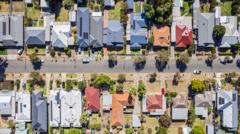Why are Australian house prices so exorbitant? The primary reason is that construction has not kept pace with the growing population, creating a crisis of availability that has made homes prohibitively expensive. Rigorous planning laws further constrain the ability to build in desirable areas, particularly in metropolitan hubs like Sydney and Melbourne, which suffer from low density compared to other major global cities.
The decline in public housing options, coupled with burgeoning waitlists, has led to increased instances of homelessness and overcrowding, particularly as climate change renders certain regions less livable. Moreover, decades of policy have shifted the perception of owning property from a basic right to an investment opportunity.
According to a 2023 Demographia survey, Sydney ranks as the second least affordable city worldwide, with average home prices nearing A$1.2 million. Nationally, housing prices have surged 39.1% over the past five years, while wages have stagnated, leaving potential homeowners needing approximately ten years to save for a deposit.
The rental landscape is equally grim, with a national average rent increase of 36.1% since the pandemic began, leading to significant financial strain for renters. Sydney's median weekly rent now stands at A$773, followed closely by Perth and Canberra.
While immigration and foreign buyers are frequently blamed for exacerbating the housing crisis, experts argue their actual impact is minimal. Temporary migrants often occupy dedicated accommodations rather than entering the housing market, and foreign buyer purchases accounted for less than 1% of total home sales in the last year.
In response, Labor has pledged to construct 1.2 million new homes by 2029 and announced a A$33 billion housing investment aimed at reducing the barriers for first-time homebuyers. They also plan to expand social housing and offer subsidies for low to moderate-income earners.
Conversely, the Coalition's approach includes caps on immigration, limiting international students, and restricting foreign investment in existing properties for two years. An additional A$5 billion commitment to infrastructure is also part of their strategy.
The Greens party focuses specifically on renters, advocating national rent freezes and calling for reforms to tax incentives for property investors.
Experts have expressed skepticism regarding the sufficiency of either party's plans, suggesting that a combination of both may be necessary to address the deep-rooted housing issues effectively. Additionally, the expectation that the federal government will meet housing construction targets appears dubious, with forecasts suggesting significant shortfalls.
The situation reflects long-term neglect regarding social housing investments, with only 4% of housing stock dedicated to this purpose, considerably lower than in many other nations. The need for policy reform is urgent, according to analysts who warn that reversing the housing crisis will require a concerted effort over time.
As the election date approaches, the housing crisis will likely remain a central topic influencing voter decisions, marking an essential moment for Australians and their leaders.
Additional reporting by Kellie Highet in Sydney provides context for this critical issue as the nation prepares to vote.
The decline in public housing options, coupled with burgeoning waitlists, has led to increased instances of homelessness and overcrowding, particularly as climate change renders certain regions less livable. Moreover, decades of policy have shifted the perception of owning property from a basic right to an investment opportunity.
According to a 2023 Demographia survey, Sydney ranks as the second least affordable city worldwide, with average home prices nearing A$1.2 million. Nationally, housing prices have surged 39.1% over the past five years, while wages have stagnated, leaving potential homeowners needing approximately ten years to save for a deposit.
The rental landscape is equally grim, with a national average rent increase of 36.1% since the pandemic began, leading to significant financial strain for renters. Sydney's median weekly rent now stands at A$773, followed closely by Perth and Canberra.
While immigration and foreign buyers are frequently blamed for exacerbating the housing crisis, experts argue their actual impact is minimal. Temporary migrants often occupy dedicated accommodations rather than entering the housing market, and foreign buyer purchases accounted for less than 1% of total home sales in the last year.
In response, Labor has pledged to construct 1.2 million new homes by 2029 and announced a A$33 billion housing investment aimed at reducing the barriers for first-time homebuyers. They also plan to expand social housing and offer subsidies for low to moderate-income earners.
Conversely, the Coalition's approach includes caps on immigration, limiting international students, and restricting foreign investment in existing properties for two years. An additional A$5 billion commitment to infrastructure is also part of their strategy.
The Greens party focuses specifically on renters, advocating national rent freezes and calling for reforms to tax incentives for property investors.
Experts have expressed skepticism regarding the sufficiency of either party's plans, suggesting that a combination of both may be necessary to address the deep-rooted housing issues effectively. Additionally, the expectation that the federal government will meet housing construction targets appears dubious, with forecasts suggesting significant shortfalls.
The situation reflects long-term neglect regarding social housing investments, with only 4% of housing stock dedicated to this purpose, considerably lower than in many other nations. The need for policy reform is urgent, according to analysts who warn that reversing the housing crisis will require a concerted effort over time.
As the election date approaches, the housing crisis will likely remain a central topic influencing voter decisions, marking an essential moment for Australians and their leaders.
Additional reporting by Kellie Highet in Sydney provides context for this critical issue as the nation prepares to vote.





















